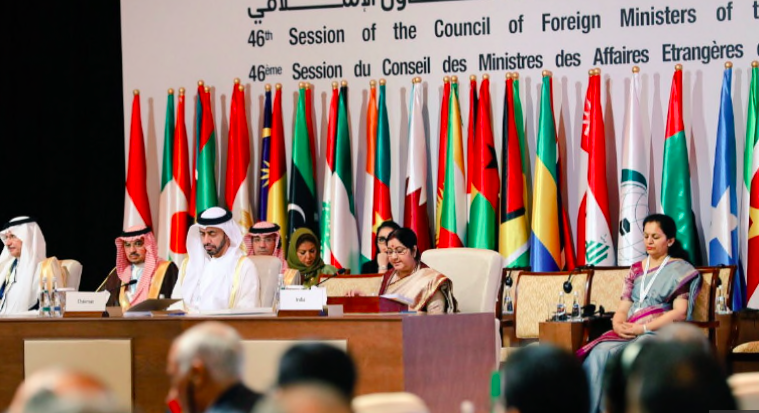Srinagar: A meeting of the Organisation of Islamic Cooperation (OIC) passed two strongly worded resolutions on Kashmir a day after it was addressed by India’s foreign minister, including a reference to “Indian terrorism”, prompting the Congress on Sunday to attack the government over its participation in the Abu Dhabi meet.
The two resolutions, one on the Kashmir issue and another on the India-Pakistan “peace process”, were part of the overall political resolution passed at the end of the meeting of OIC’s Council of Foreign Ministers on Saturday.
The first described Kashmir as the “core dispute” between the two countries and expressed concern at rights violations in “Indian occupied” Kashmir. It also described the gunning down of terrorist commander Burhan Wani as an “extra-judicial killing” and spoke of “Indian terrorism” in the state.
The second welcomed Prime Minister Imran Khan’s offer of dialogue with India, and the gesture of releasing the Indian pilot captured after warplanes from the two sides engaged each other along the Line of Control on February 27. It called for restraint and de-escalation as well as the resolution of outstanding issues through peaceful means. It also expressed concern over the violation of Pakistani airspace and affirmed Islamabad’s right to self-defence.
Congress spokesperson Manish Tewari said the government’s claims that the OIC inviting India to attend the meeting was a diplomatic success had fallen flat with the 56-member grouping adopting a resolution that “supported” Pakistan on Kashmir issue and condemned alleged “Indian barbarities”.
“External affairs minister Sushma Swaraj attended the OIC meeting in Abu Dhabi. The NDA-BJP government touted it as a huge diplomatic success for India that it has been invited to attend the plenary…But what happened in Abu Dhabi is extremely disturbing for India,” he told reporters.
Tewari said the Congress would like to ask Prime Minister Narendra Modi and Swaraj whether this was a “diplomatic achievement”.
Swaraj became the first Indian minister to address such a meeting. Her participation came despite a strong demand by Pakistan to rescind the invitation to India, resulting in Pakistan foreign minister Shah Mahmood Qureshi boycotting the plenary.
The Congress reacted strongly to the Indian government giving “legitimacy” to OIC by attending the meet and accused it of “surrendering India’s national interest”.
“The Modi government touted the invitation to the OIC as a great diplomatic success but it has turned out to be a huge embarrassment for India. The OIC resolution not just condemned Indian terrorism in Kashmir but also called India an occupier in Kashmir,” Tewari said.
“We condemn this abject surrender of national interest, in the strongest possible terms,” Tewari said.
Reacting to the resolution, India on Saturday asserted that Jammu and Kashmir is an integral part of the country and the issue is strictly internal.
External affairs ministry spokesperson Raveesh Kumar said, “As regards the resolutions on Jammu and Kashmir, our stand is consistent and well known. We reaffirm that Jammu and Kashmir is an integral part of India and is a matter strictly internal to India.”
However, Tewari said this was just a “face saving” exercise.
People familiar with developments said these resolutions were drafted weeks ahead of the meeting and used language that was similar to that which appeared in past OIC resolutions. The people said the invitation to India despite Pakistan’s opposition was a big breakthrough.
“The Abu Dhabi Declaration, the main communique negotiated at the meeting, made no mention of India or Kashmir. This was because of the efforts of OIC members who are friendly with India,” said a person who spoke on condition of anonymity.

